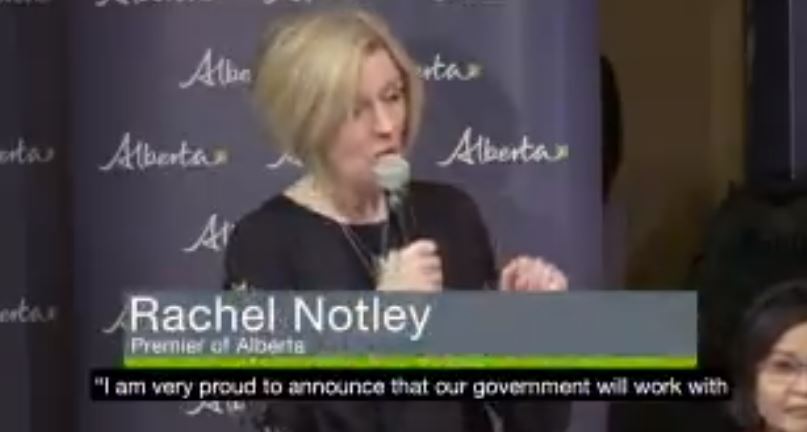Filipino language and culture studies to be offered in Alberta, Canada schools
By: Atom L. Pornel
|
Published on: February 13, 2019

PHOTO CREDIT: Premier of Alberta Rachel Notley Twitter
Canadians will soon have the opportunity to learn the Filipino language and culture through the new K-12 curriculum being developed in Alberta, Canada.
Alberta Premier Rachel Notley made the announcement about the adding of Filipino to the 26 languages currently offered in Alberta schools. The inclusion of the Philippines’ language will be accessible as part of school curriculum in Alberta, Canada starting 2020.
At present, only a few schools have been offering locally designed Filipino language and culture classes such as Edmonton Catholic Schools and Leduc-based St. Thomas Aquinas Roman Catholic Schools.
The Filipino program will now be expanded from kindergarten to Grade 12 students as announced by the Premier of Alberta on February 7.
In a video tweet, Notley said that the program will be offered following “community requests to improve Filipino language offerings in schools.”
“I am very proud to announce that our government will work with you to develop a kindergarten to Grade 12 Filipino language and culture curriculum… So that will be done for use in Alberta’s schools across the province…
We’ll be reaching out to you in the coming weeks through our Department of Education to begin the consultation. And our plan is to have that program ready to go for the school year starting September in 2020.”
Notley also acknowledged the contributions of Filipino workers and community saying that adding Filipino language and culture to schools would help them to prosper.
“As one of the largest and fastest-growing populations, the Filipino community has brought essential skills to our workforce and added so much to our social fabric… Creating a K-12 Filipino language and culture curriculum will ensure this vibrant community can continue to grow deep roots and make this province even greater,” Notley added.
Education Minister David Eggen said that there is a demand for Filipino language to be taught in schools making him decide to have it as an added program.
“It’s not just the language. Language is where culture resides, and also, teaching language is a sign of respect and acknowledgement,” Eggen said noting the 170,000 Filipinos living in Alberta.
In a statement, Filipino community leader Dolly Castillo called the curriculum a “historic gift” to the community. Castillo said, “Programs like this instill pride in students and their heritage and results in active and engaged citizens.”
Filipino theater student Chelo Ledesma who migrated to Edmonton, Alberta with her family two years ago gave positive reaction for the upcoming program.
She said in an interview with Good News Pilipinas, “Pansin ko nga na may Chinese, Korean, Spanish, French course, etc. Mas mabuti kung ganun kasi alam ko third yata ang mga Filipino sa pinakamaraming immigrant around dito sa Alberta.” (I noticed that there are Chinese, Korean, Spanish, French course, etc. It’s good that they are going to implement it, considering that, I think, top 3 immigrants here in Alberta are Filipinos.)
With the availability of Filipino course in schools, she said it would be less hassle in the future for someone like her who had taken the subject while she was studying in the Philippines before moving to Canada.
“Tulad ko na (nag-aral) sa university sa Pilipinas. Tapos pagdating dito kailangan ko pa ng Alberta diploma. Sobrang mas less yung load kapag maki-credit yung course na ganun lalo na sa mga working student na gaya ko (I took it up when I was in the Philippines but I had to take it again to acquire the Alberta diploma. It would lessen the academic load especially for working students like me.)
For her two younger siblings who would be benefiting from the Filipino curriculum, she shared, “Mas mabuti in a sense na kahit parang obliged silang mag-aral ng Ingles dito for a living. Mas mabuti yung may option pa rin sila na mapagaralan yung sarili nilang wika.” (I would be nice for them though they are obliged to study English, they have the option to learn our own language.)
With Filipino being added to Alberta curriculum next year, interested families will now have options for their children to lean the language and culture and connect to their Pinoy roots.
Like, Follow, Subscribe to GoodNewsPilipinas.com Facebook, Twitter, Instagram, Good News Pilipinas! TV on YouTube, new story notifications and e-mail newsletters for updates on more Filipino Pride stories.